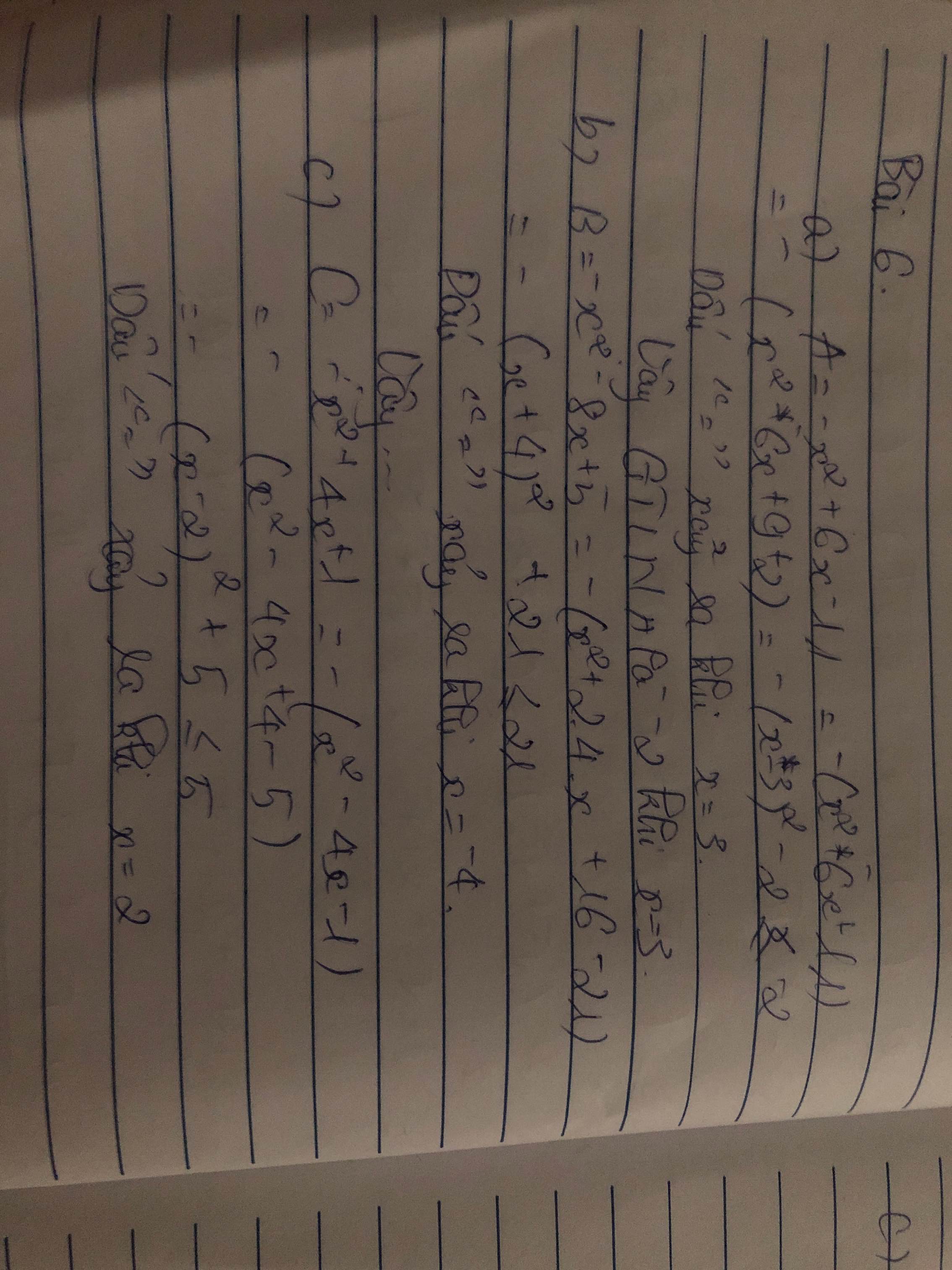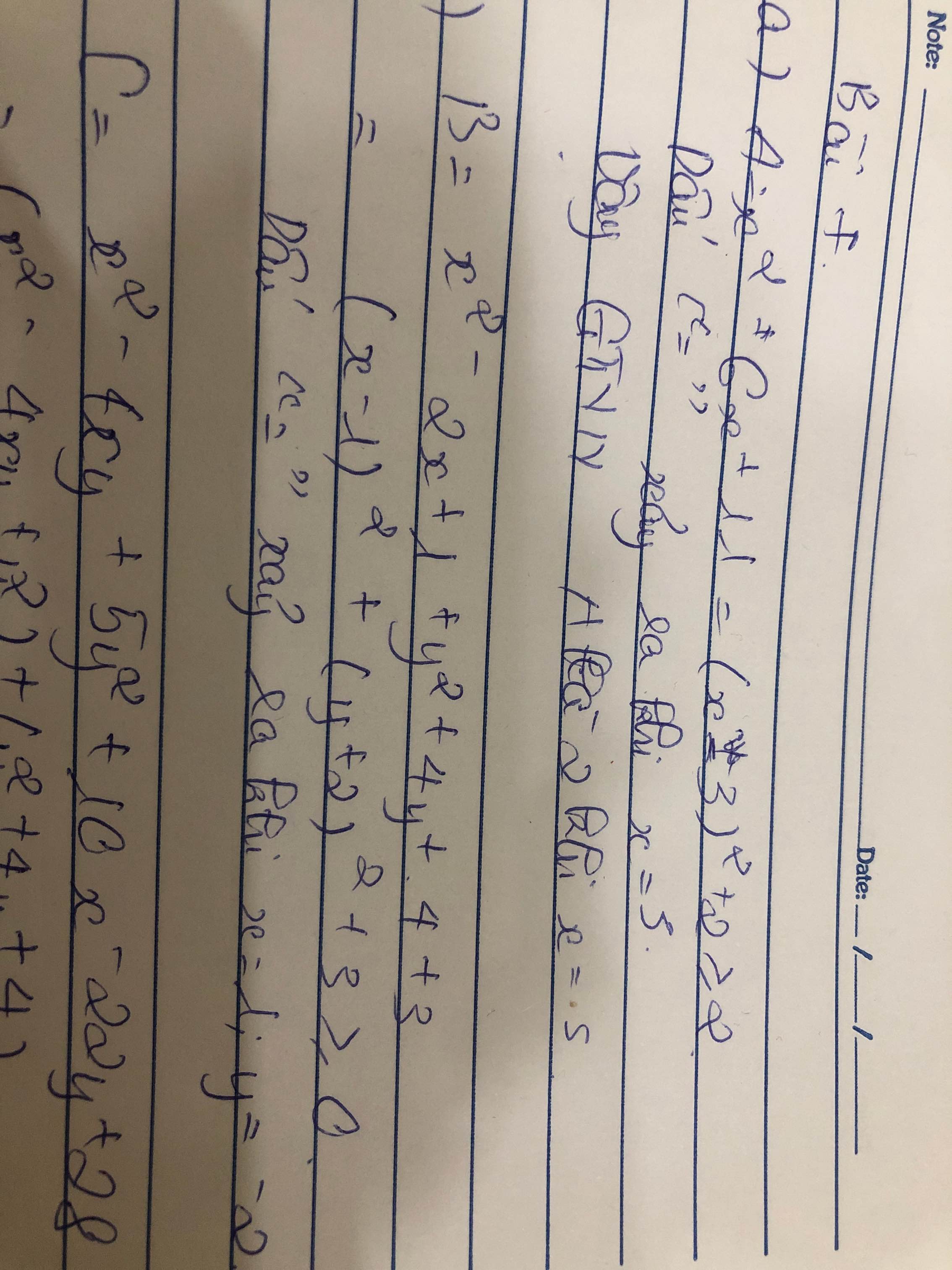Hãy nhập câu hỏi của bạn vào đây, nếu là tài khoản VIP, bạn sẽ được ưu tiên trả lời.

2. Ta có: A = x2 - 6x + 5 = (x2 - 6x + 9) - 4 = (x - 3)2 - 4
Ta luôn có: (x - 3)2 \(\ge\)0 \(\forall\)x
=> (x - 3)2 - 4 \(\ge\)-4 \(\forall\)x
Dấu "=" xảy ra <=> x - 3 = 0 <=> x = 3
Vậy MinA = -4 tại x = 3
Ta có: B = 4x2 - 8x + 7 = 4(x2 - 2x + 1) + 3 = 4(x - 1)2 + 3
Ta luôn có: 4(x - 1)2 \(\ge\)0 \(\forall\)x
=> 4(x - 1)2 + 3 \(\ge\)3 \(\forall\)x
Dấu "=" xảy ra <=> x - 1 = 0 <=> x = 1
vậy MinB = 3 tại x = 1
Ta có: C = 2x2 + 4x - 6 = 2(x2 + 2x + 1) - 8 = 2(x + 1)2 - 8
Ta luôn có: 2(x + 1)2 \(\ge\)0 \(\forall\)x
=> 2(x + 1)2 - 8 \(\ge\)-8 \(\forall\)x
Dấu "=" xảy ra <=> x + 1 = 0 <=> x = -1
Vậy MinC = -8 tại x = -1
1/
\(A=x^2-6x+5\)
\(A=x^2-2\cdot3x+3^2-3^2+5\)
\(A=\left(x-3\right)^2-3^2+5\)
\(A=\left(x-3\right)^2-9+5\)
\(A=\left(x-3\right)^2-4\)
mà \(\left(x-3\right)^2\ge0\Rightarrow\left(x-3\right)^2-4\ge-4\)
\(\Rightarrow GTNNA\left(x^2-6x+5\right)=-4\)
với \(\left(x-3\right)^2=0;x=3\)
\(B=4x^2-8x+7\)
\(B=4\left(x^2-2x+\frac{7}{4}\right)\)
\(B=4\left(x^2-2\cdot1x+1-1+\frac{7}{4}\right)\)
\(B=4\left(x-1\right)^2+3\)
\(\left(x-1\right)^2\ge0\Rightarrow4\left(x^2-1\right)^2+3\ge3\)
\(\Rightarrow GTNNB=3\)
với \(\left(x-1\right)^2=0;x=1\)
\(C=2x^2+4x-6\)
\(C=2\left(x^2+2x-3\right)\)
\(C=2\left(x^2+2\cdot1x+1-1-3\right)\)
\(C=\left(x+1\right)^2-8\)
có\(\left(x+1\right)^2\ge0\Rightarrow\left(x+1\right)^2-8\ge-8\)
\(\Rightarrow GTNNC=-8\)
với \(\left(x+1\right)^2=0;x=-1\)

\(2,GTNN\)
\(A=x^2-6x+5=x^2+6x+9-4\)
\(=\left(x+3\right)^2-4\ge-4\)
\(A_{min}=-4\Leftrightarrow\left(x+3\right)^2=0\Rightarrow x=-3\)
\(B=4x^2-8x+7=4\left(x^2-2x+\frac{7}{4}\right)\)
\(=4\left(x^2-2x+1+\frac{3}{4}\right)=4\left(x-1\right)^2+3\ge3\)
\(\Rightarrow B_{min}=3\Leftrightarrow\left(x-1\right)^2=0\Rightarrow x=1\)
\(C=2x^2+4x-6=2\left(x^2+2x-3\right)\)
\(=2\left(x^2+2x+1-4\right)=2\left(x+1\right)^2-8\ge-8\)
\(\Rightarrow C_{min}=-8\Leftrightarrow\left(x+1\right)^2=0\Rightarrow x=-1\)
\(3,GTLN\)
\(A=-x^2+2x-3=-\left(x^2-2x+3\right)\)
\(=-\left(x^2-2x+1-4\right)=-\left(x-1\right)^2+4\le4\)
\(A_{max}=4\Leftrightarrow-\left(x-1\right)^2=0\Rightarrow x=1\)
\(B=-9x^2+6x-4=-\left[9x^2-6x+4\right]\)
\(=-\left[\left(3x\right)^2-6x+1+3\right]=-\left(3x-1\right)^2-3\)
\(B_{max}=-3\Leftrightarrow-\left(3x-1\right)^2=0\Rightarrow x=\frac{1}{3}\)
\(C=-3x^2-6x+9=-3\left(x^2+2x-3\right)\)
\(=-3\left(x^2+2x+1-4\right)=-3\left(x+1\right)^2+12\)
\(C_{max}=12\Leftrightarrow-3\left(x+1\right)^2=0\Rightarrow x=-1\)

1. Đề bài sai, các biểu thức này chỉ có giá trị lớn nhất, không có giá trị nhỏ nhất
2.
\(A=\left(2x\right)^3-3^3-\left(8x^3+2\right)\)
\(=8x^3-27-8x^3-2\)
\(=-29\)
\(B=x^3+9x^2+27x+27-\left(x^3+9x^2+27x+243\right)\)
\(=27-243=-216\)
sửa đề lại thành tìm Max nhé1, vì mấy ý này ko có min
\(1,=>D=-\left(x^2-4x-3\right)=-\left(x^2-2.2x+4-7\right)\)
\(=-[\left(x-2\right)^2-7]=-\left(x-2\right)^2+7\le7\)
dấu"=" xảy ra<=>x=2
2, \(E=-2\left(x^2-x+\dfrac{5}{2}\right)=-2[x^2-2.\dfrac{1}{2}x+\dfrac{1}{4}+\dfrac{9}{4}]\)
\(=-2[\left(x-\dfrac{1}{2}\right)^2+\dfrac{9}{4}]\le-\dfrac{9}{2}\) dấu"=" xảy ra<=>x=1/2
3, \(F=-\left(x^2+4x-20\right)=-\left(x^2+2.2x+4-24\right)\)
\(=-[\left(x+2\right)^2-24]\le24\) dấu"=" xảy ra<=>x=-2

Bài 1:
a: \(A=x^2+2x+4\)
\(=x^2+2x+1+3\)
\(=\left(x+1\right)^2+3>=3\forall x\)
Dấu '=' xảy ra khi x+1=0
=>x=-1
Vậy: \(A_{min}=3\) khi x=-1
b: \(B=x^2-20x+101\)
\(=x^2-20x+100+1\)
\(=\left(x-10\right)^2+1>=1\forall x\)
Dấu '=' xảy ra khi x-10=0
=>x=10
Vậy: \(B_{min}=1\) khi x=10
c: \(C=x^2-2x+y^2+4y+8\)
\(=x^2-2x+1+y^2+4y+4+3\)
\(=\left(x-1\right)^2+\left(y+2\right)^2+3>=3\forall x\)
Dấu '=' xảy ra khi x-1=0 và y+2=0
=>x=1 và y=-2
Vậy: \(C_{min}=3\) khi (x,y)=(1;-2)
Bài 2:
a: \(A=5-8x-x^2\)
\(=-\left(x^2+8x\right)+5\)
\(=-\left(x^2+8x+16-16\right)+5\)
\(=-\left(x+4\right)^2+16+5=-\left(x+4\right)^2+21< =21\forall x\)
Dấu '=' xảy ra khi x+4=0
=>x=-4
b: \(B=x-x^2\)
\(=-\left(x^2-x\right)\)
\(=-\left(x^2-x+\dfrac{1}{4}-\dfrac{1}{4}\right)\)
\(=-\left(x-\dfrac{1}{2}\right)^2+\dfrac{1}{4}< =\dfrac{1}{4}\forall x\)
Dấu '=' xảy ra khi \(x-\dfrac{1}{2}=0\)
=>\(x=\dfrac{1}{2}\)
c: \(C=4x-x^2+3\)
\(=-x^2+4x-4+7\)
\(=-\left(x^2-4x+4\right)+7\)
\(=-\left(x-2\right)^2+7< =7\forall x\)
Dấu '=' xảy ra khi x-2=0
=>x=2
d: \(D=-x^2+6x-11\)
\(=-\left(x^2-6x+11\right)\)
\(=-\left(x^2-6x+9+2\right)\)
\(=-\left(x-3\right)^2-2< =-2\forall x\)
Dấu '=' xảy ra khi x-3=0
=>x=3

1:
=x^2-6x+9-4=(x-3)^2-4>=-4
Dấu = xảy ra khi x=3
3: =-y^2-4y-4+13
=-(y+2)^2+13<=13
Dấu = xảy ra khi y=-2
4: D=x^2-8>=-8
Dấu = xảy ra khi x=0

\(1,\\ a,A=4x^2\left(-3x^2+1\right)+6x^2\left(2x^2-1\right)+x^2\\ A=-12x^4+4x^2+12x^2-6x^2+x^2=-x^2=-\left(-1\right)^2=-1\\ b,B=x^2\left(-2y^3-2y^2+1\right)-2y^2\left(x^2y+x^2\right)\\ B=-2x^2y^3-2x^2y^2+x^2-2x^2y^3-2x^2y^2\\ B=-4x^2y^3-4x^2y^2+x^2\\ B=-4\left(0,5\right)^2\left(-\dfrac{1}{2}\right)^3-4\left(0,5\right)^2\left(-\dfrac{1}{2}\right)^2+\left(0,5\right)^2\\ B=\dfrac{1}{8}-\dfrac{1}{4}+\dfrac{1}{4}=\dfrac{1}{8}\)
\(2,\\ a,\Leftrightarrow10x-16-12x+15=12x-16+11\\ \Leftrightarrow-14x=-4\\ \Leftrightarrow x=\dfrac{2}{7}\\ b,\Leftrightarrow12x^2-4x^3+3x^3-12x^2=8\\ \Leftrightarrow-x^3=8=-2^3\\ \Leftrightarrow x=2\\ c,\Leftrightarrow4x^2\left(4x-2\right)-x^3+8x^2=15\\ \Leftrightarrow16x^3-8x^2-x^3+8x^2=15\\ \Leftrightarrow15x^3=15\\ \Leftrightarrow x^3=1\Leftrightarrow x=1\)

a) Ta có: \(25x^2-20x+7\)
\(=\left(5x\right)^2-2\cdot5x\cdot2+4+3\)
\(=\left(5x-2\right)^2+3\ge3\forall x\)
Dấu '=' xảy ra khi \(x=\dfrac{2}{5}\)
b) Ta có: \(9x^2-6x+2\)
\(=9x^2-6x+1+1\)
\(=\left(3x-1\right)^2+1\ge1\forall x\)
Dấu '=' xảy ra khi \(x=\dfrac{1}{3}\)
c) Ta có: \(-x^2+2x-2\)
\(=-\left(x^2-2x+2\right)\)
\(=-\left(x^2-2x+1+1\right)\)
\(=-\left(x-1\right)^2-1\le-1\forall x\)
Dấu '=' xảy ra khi x-1=0
hay x=1
d) Ta có: \(x^2+12x+39\)
\(=x^2+12x+36+3\)
\(=\left(x+6\right)^2+3\ge3\forall x\)
Dấu '=' xảy ra khi x=-6
e) Ta có: \(-x^2-12x\)
\(=-\left(x^2+12x+36-36\right)\)
\(=-\left(x+6\right)^2+36\le36\forall x\)
Dấu '=' xảy ra khi x=-6
f) Ta có: \(4x-x^2+1\)
\(=-\left(x^2-4x-1\right)\)
\(=-\left(x^2-4x+4-5\right)\)
\(=-\left(x-2\right)^2+5\le5\forall x\)
Dấu '=' xảy ra khi x=2

a) Ta có: \(25x^2-20x+7\)
\(=\left(5x\right)^2-2\cdot5x\cdot2+4+3\)
\(=\left(5x-2\right)^2+3\ge3\forall x\)
Dấu '=' xảy ra khi \(x=\dfrac{2}{5}\)
b) Ta có: \(9x^2-6x+2\)
\(=9x^2-6x+1+1\)
\(=\left(3x-1\right)^2+1\ge1\forall x\)
Dấu '=' xảy ra khi \(x=\dfrac{1}{3}\)
c) Ta có: \(-x^2+2x-2\)
\(=-\left(x^2-2x+2\right)\)
\(=-\left(x^2-2x+1+1\right)\)
\(=-\left(x-1\right)^2-1\le-1\forall x\)
Dấu '=' xảy ra khi x=1
( Mình trình bày mẫu câu a các câu khác mình làm tắt lại nhưng tương tự trình bày câu a nha )
a, Ta có : \(25x^2-20x+7=\left(5x\right)^2-2.5x.2+2^2+3\)
\(=\left(5x-2\right)^2+3\)
Thấy : \(\left(5x-2\right)^2\ge0\forall x\in R\)
\(\Rightarrow\left(5x-2\right)^2+3\ge3\forall x\in R\)
Vậy \(Min=3\Leftrightarrow5x-2=0\Leftrightarrow x=\dfrac{2}{5}\)
b, \(=9x^2-2.3x+1+1=\left(3x-1\right)^2+1\ge1\)
Vậy Min = 1 <=> x = 1/3
c, \(=-x^2+2x-1-1=-\left(x^2-2x+1\right)-1=-\left(x-1\right)^2-1\le-1\)
Vậy Max = -1 <=> x = 1
d, \(=x^2+2.x.6+36+3=\left(x+6\right)^2+3\ge3\)
Vậy Min = 3 <=> x = - 6
e, \(=-x^2-2.x.6-36+36=-\left(x+6\right)^2+36\le36\)
Vậy Max = 36 <=> x = -6 .
f, \(=-x^2+4x-4+5=-\left(x^2-4x+4\right)+5=-\left(x-2\right)^2+5\le5\)
Vậy Max = 5 <=> x = 2


2.
c) \(C=2x^2+4x-6=2\left(x^2+2x+1\right)-8\)
\(=2\left(x+1\right)^2-8\ge-8\forall x\)
Dấu"=" xảy ra<=> \(2\left(x+1\right)^2=0\Leftrightarrow x=-1\)
3.
c) \(C=-3x^2-6x+9=-3\left(x^2+2x+1\right)+12\)
\(=-3\left(x+1\right)^2+12\le12\forall x\)
Dấu "=" xảy ra<=> \(-3\left(x+1\right)^2=0\Leftrightarrow x=-1\)